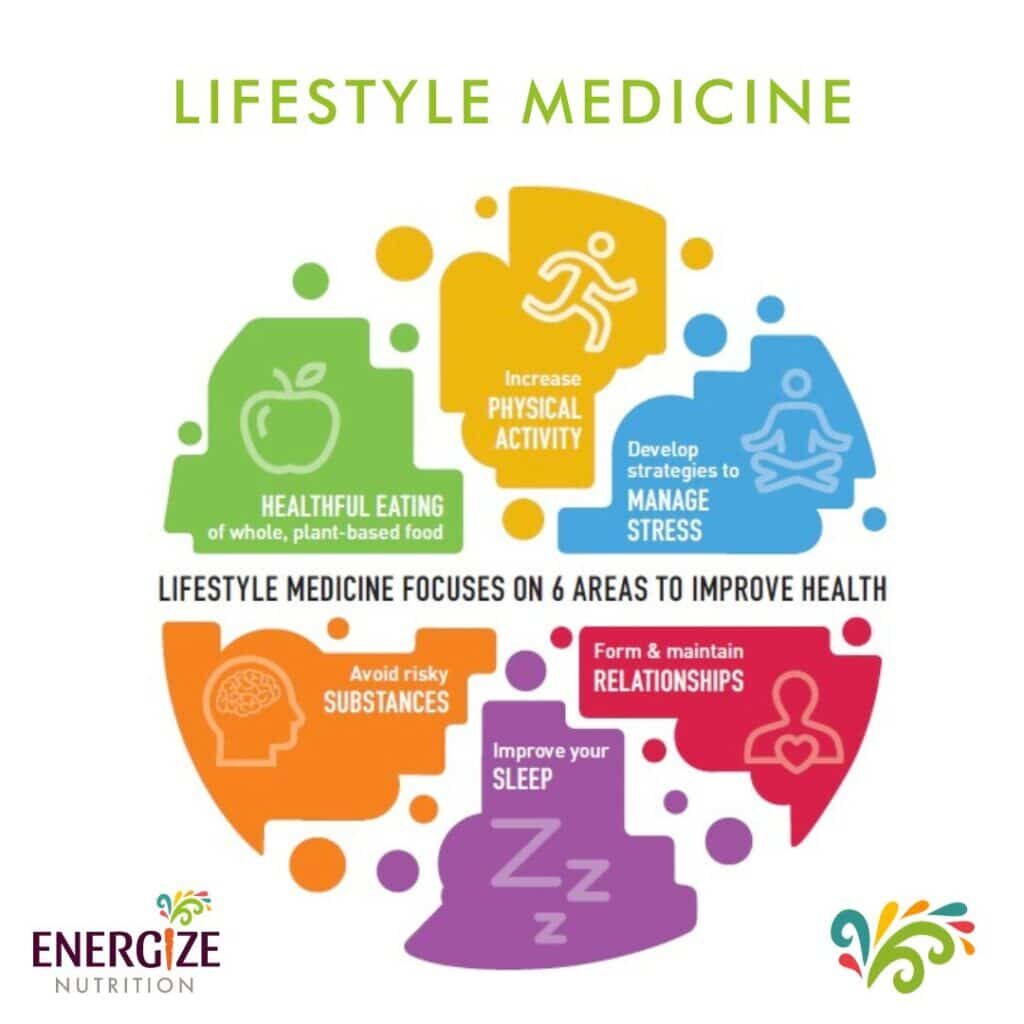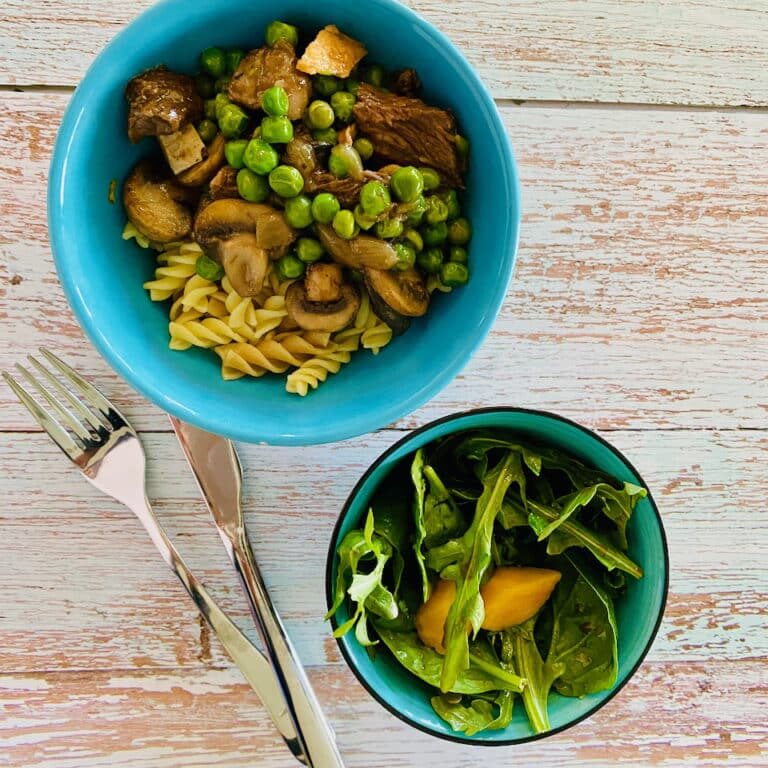The Mediterranean Diet: what is it, why it matters in midlife and 12 tasty food tips to get started
In midlife, you want the freedom to enjoy delicious food so you can feel great about yourself and maintain an active lifestyle as you age. What if there was a diet that gave you this freedom and flexibility to focus on the foods you actually like to eat, and it was good for you?
The Mediterranean Diet: What is it
You have probably heard of it, the Mediterranean diet, but what exactly is it? The Mediterranean diet is one of the most studied dietary patterns and is highly ranked for its health benefits, variety, and ease of sustaining. The Mediterranean diet isn’t an actual diet, but rather is a way of eating that features foods from countries around the mediterranean basin such as Spain, southern Italy, Greece and France. The Mediterranean diet is also a lifestyle that emphasizes qualities that many of us in midlife most value – slowing down, appreciating food, enjoying meals with family and friends, managing stress and including movement into our daily routines.
The Mediterranean Diet: What it is not
The Mediterranean diet is not a restrictive diet. Rather, it allows you to be flexible with your food choices based on your unique preferences and does not focus on weight loss as a marker of success. Unfortunately it also does not mean endless plates of pasta, pizza and unlimited red wine (sorry!).
The Mediterranean Diet: Why it matters in midlife
In midlife, our attention is pulled in many different directions – work, family and finances.
Proper nutrition throughout our lives especially in midlife is an important factor in healthy aging. As we age, our bodies experience some (natural) changes that can impact our health. Some of these changes may include hormonal changes, increased inflammation as well as decreased muscle mass and insulin sensitivity leading to higher blood sugars.
We can’t do the roller coaster of restrictive and rigid plans anymore. We need shame-free ways to break out of unhealthy habits so we can feel confident and enjoy the life that we have built, while also supporting our health now and in the future. Individuals that followed a Mediterranean style of eating have been shown to age healthfully, reinforcing the idea that prevention of age-related chronic illness is the key. Because the Mediterranean Diet is a dietary pattern, it has lots of room for freedom and flexible food choices.
Health Benefits of the Mediterranean Diet
You may have heard that the Mediterranean diet is good for your midlife health but did you know just how many other health conditions that can benefit from this style of eating?
Mediterranean Diet & Mental Health
- A Mediterranean style of eating has been shown to improve some well-known chronic illnesses like heart disease and diabetes, but did you also know that the Mediterranean diet can also support our mental health?
- Research from around the world has found that the Mediterranean diet supported mental health by preventing depression and reducing symptoms of major depressive disorder among those who had depression. After following a Mediterranean style of eating for 12 weeks, their mood scores significantly improved. Talk with your physician before making any changes to managing your mental health.
Mediterranean Diet & Dementia, Alzheimers and other cognitive disorders
- Our lives are a collection of memories. Most of us find in midlife that our memory and mental sharpness may not be what it once was. Many of us know of someone who has experienced some age-related memory decline.
- Researchers examined a large body of observational studies and noticed that those who followed a high quality diet such as a Mediterranean style of eating, had lower incidences of developing cognitive disorders such as Dementia and Alzheimers.
Other impacts of Mediterranean Diet on Heart Health, Diabetes and Gut Health
The Mediterranean Diet has been found to:
- Promote heart health by improving risk factors for heart disease such as lowering blood pressure and cholesterol.
- Prevent and manage diabetes by improving how our bodies process carbohydrates.
- Improve gut health by promoting the growth of healthy bacteria in the microbiome.
The Mediterranean diet is a pattern of eating that can be adapted to support many different health conditions, while also allowing flexibility to accommodate diverse food preferences for people and their families.
Foods to eat in the Mediterranean Diet
While many consumers are familiar with individual vitamins and minerals, we eat foods, not nutrients. Research is showing that a focus on dietary patterns is more important and the preferred approach than to focus on individual nutrients. A Mediterranean diet focuses on whole, nutrient-rich foods while limiting highly processed foods.
The Mediterranean Diet is an eating pattern that includes daily intake of:
- Vegetables
- Fruits
- Whole grains
- Legumes
- Nuts
- Extra-virgin olive oil
- Herbs and spices
These foods form the foundation of a Mediterranean style diet and are eaten each day, throughout the day. If you drink alcohol, do so responsibly and in moderation, limiting your intake to 1- 5oz glass of red wine a day.
Protein sources in the Mediterranean Diet:
Protein-rich foods are included daily in the Mediterranean Diet, but their sources may vary through the week:
- The Mediterranean diet can include lean sources of meat such as poultry and eggs and moderate amounts of low fat dairy
- Red meat such as beef is limited to no more than 500g per week per person
- Include 3 servings (3-4oz per serving) of fish or seafood a week
- Legumes such as beans and lentils as well as whole grains are high-fibre plant-based proteins. The fibre found in these protein-rich foods can help with digestion and managing blood sugar and cholesterol levels.
Fat sources in the Mediterranean Diet
The main type of fat in this diet comes from healthier fats like monounsaturated and omega-3 fatty acids.
- Extra-virgin olive oil is used for cooking, salads and at the table.
- Other food sources of fat include avocado, nuts, seeds and omega-3 rich fish such as salmon, and trout.
How much food should I eat on a Mediterranean Diet?
The Mediterranean diet is not prescriptive and does not indicate how much you should be eating. Portion sizes can vary and depend on our body size and physical activity level. People living in larger bodies will need more fuel. To determine how much to eat, pause and check in with your body to determine hunger levels and slow down during eating to recognize the feeling of comfortable fullness and satisfaction. No one can possibly know how much food you actually need to fuel your body except for you.
The Mediterranean Diet: how to get started
The Mediterranean diet is flexible and allows you to enjoy a variety of different foods, which is good news because most of us in midlife & beyond are tired of rules!
- Start by thinking about what foods you can add to your diet. These foods, when they form the foundation of what you eat, naturally crowd out the more processed foods.
- Start with one small change that you think you will be able to achieve and go from there! The only way to get started is to get started!
12 food tips to get you started with the Mediterranean diet :
- Include a variety of fruits and vegetables at all meals.
- Try shredded veggies in a wrap, a few different veggies and fruits in a buddha bowl, berries at breakfast, apples with peanut butter for a snack, fruit for dessert.
- Switch to whole grains.
- Explore whole grains like whole wheat, oats, brown rice, quinoa, barley and farro.
- Swap out products with white flour. Swap in whole grain varieties of bread, wraps, pasta, crackers, etc.
- Try a barley breakfast bowl, or a quinoa salad for lunch.
- Use extra-virgin olive oil for cooking and at the table.
- Extra-virgin olive oil comes from the first pressing of the olives, so this type of olive oil has more antioxidants than pure olive oil.
- Swap in olive oil instead of butter. Dip bread in olive oil and balsamic vinegar instead.
- Make a simple vinaigrette with olive oil and vinegar to dress salads and vegetables. Whisk together 2 tbsp olive oil, ¼ cup apple cider vinegar, 1 tsp Dijon mustard, salt and pepper. Sweeten as desired.
- Include other whole food sources of fat.
- Nuts, seeds and avocados contain healthier sources of fat.
- Top oatmeal or cereal with walnuts, pumpkin seeds or slivered almonds.
- Try adding avocado instead of bacon on sandwiches and wraps or add nuts and seeds to salads instead of cheese.
- Add in plant-based proteins at your meals or snacks.
- Plant based proteins include beans, lentils, tofu, whole grains, nuts and seeds.
- Have at least one meal a day that includes plant-based proteins.
- Sprinkle hemp hearts on whole grain toast with peanut butter or add ground flax or chia seeds to smoothies and cereal.
- In your wrap, add mashed beans instead of lunch meat or roasted chickpeas in a salad or as a tasty snack.
- Have meat as part of your meal rather than as the main dish.
- Use beans, lentil or whole grains to add protein and a variety of different vegetables to bulk up a meal.
- Add in mushrooms or mashed black beans to beef burgers, red lentils to pasta sauce, soup or chilli.
- Swap in lean protein sources more often.
- Chicken, turkey and eggs contain less fat than red meats.
- Try ground turkey meatballs or a vegetable frittata for dinner.
- Include fish and seafood 2-3 times a week.
- Try tuna, salmon, mackerel, lake trout, herring, or sardines. Try grilling, baking or broiling.
- Enjoy a fish taco, a tuna salad wrap, or sheet-pan salmon.
- Enjoy some lower fat dairy
- Have 1% or non-fat dairy products instead of full-fat dairy like unsweetened Greek or regular yogurt, milk and cheese.
- Try 2% milk in your coffee in place of cream.
- Limit sweets and desserts to a few times a week.
- The Mediterranean Dietary pattern suggests up to 3 times a week. Another way of thinking about this is to include sweets and desserts to the least amount you need to enjoy.
- Sweeten your cereal or yogurt with fresh or dried fruit instead of adding refined sugar.
- Try a baked apple with cinnamon for a sweet fix.
- Vegetables should not be naked so give them seasoning. Use salt as needed to flavour your whole foods. Consider other sources of flavour.
- Use herbs and spices like basil, oregano and garlic to add in flavour to foods, and salt as needed for your desired flavour.
- Fresh herbs like parsley, basil or mint can be added to your salad or smoothie for a burst of freshness.
- Focus on choosing more whole, less processed foods as a foundation in your diet.
- Check out these free recipes for more whole, less processed food ideas.
Final thoughts: Lifestyle is an important part of the Mediterranean Diet
The Mediterranean diet does not just focus on what you eat but also how you eat and live. Some of the health benefits observed from the Mediterranean diet can be attributed to lifestyle.
Some tips to fully benefit from a Mediterranean lifestyle include:
- Carve out small pockets of time to prepare simple and basic meals at home. We are not talking about complicated or fussy multi-course meals here.
- Wine-taste your food. Eat slowly and mindfully, free from distractions while appreciating the different tastes, colors and textures of our foods.
- Eat socially. Make eating a social event by enjoying food with family and/or friends.
- Include enjoyable physical movement into your day when possible, take the stairs or go for a walk. Remember, some movement is better than none.
- Include coping strategies to help manage the ever-present stress of our lives.
- Prioritize a restful and restorative sleep. Establish good sleep hygiene habits.
How can YOU get started?
- Take this Mediterranean Diet Quiz to see how your current diet compares to the Mediterranean style of eating.
- Use this resource to make goals and identify areas of your diet that you like to make a change.
- Have a look at the Mediterranean Diet Pyramid to get a better idea of how often we should be eating certain foods.
- Try a new recipe. Here are some great ideas to choose from.
Be sure to stay tuned for our follow up post on a Mediterranean Diet Meal Makeover!
Written by: Kenzie Urban, Dietetic Intern, University of Alberta
References
Anderson, TJ. Grégoire, J. Pearson, GJ. Barry, AR. Couture, P. Dawes, M et al. 2016 Canadian Cardiovascular Society Guidelines for the Management of Dyslipidemia for the Prevention of Cardiovascular Disease in the Adult. Can J Cardiol. 32(11):1263-1282. Retrieved from https://pubmed.ncbi.nlm.nih.gov/27712954/.
Jacka, FN. O’Neil, A. Opie, R. Itsiopoulos, C. Cotton, S. Mohebbi, M et al. 2017. A randomised controlled trial of dietary improvement for adults with major depression (the “SMILES” trial). BMC Med. 15(1):23. Reterived from https://bmcmedicine.biomedcentral.com/articles/10.1186/s12916-017-0791-y
Jannashc F, Kröger J, Schulze MB. Dietary patterns and type 2 diabetes: A systematic literature review and meta-analyses of prospective studies. J Nutr. 2017;147(6):1174-1182. Retrieved from https://pubmed.ncbi.nlm.nih.gov/28424256/.
Metabolic Syndrome Canada. n.d. Eating the Mediterranean Way. Retrieved from https://dash-chg.s3.amazonaws.com/resources/change_eating_medway_2016_0.pdf.
Merra, G., Noce, A., Marrone, G., Cintoni, M., Tarsitano, M. G., Capacci, A., & De Lorenzo, A. 2020. Influence of Mediterranean Diet on Human Gut Microbiota. Nutrients, 13(1):7. Retrieved from https://www.mdpi.com/2072-6643/13/1/7.
Molendijk, M. Molero, P. Ortuño Sánchez-Pedreño, F. Van der Does, W. Angel Martínez-González, M. 2018. Diet quality and depression risk: A systematic review and dose-response meta-analysis of prospective studies. J Affect Disord. 226:346-354. Retrieved from https://pubmed.ncbi.nlm.nih.gov/29031185/
Radd-Vagenas, S. Duffy SL, Maismith. SL, Brew BJ. Flood, VM. Fiatarone Singh, MA. 2018. Effect of the Mediterranean diet on cognition and brain morphology and function: a systematic review of randomized controlled trials. Am J Clin Nutr. 107(3):389-404. https://pubmed.ncbi.nlm.nih.gov/29566197/
Wu, L. Sun, D. 2017. Adherence to Mediterrane an diet and risk of cognitive disorders: An updated systematic review and meta- analysis of prospective cohort studies. Sci Rep. 7;41317. doi: 10.1038/srep41317. https://pubmed.ncbi.nlm.nih.gov/28112268/.
Tagged in: Calgary Dietitian, Calgary Nutritionist, foods to eat, healthy eating, meal planning, Mediterranean diet, midlife, midlife nutrition, Over 40, perimenopause, plant-based diet, what to eat
2 Comments
Leave a Comment


Welcome to the Energize Nutrition blog, where we share evidence-based nutrition content, designed to empower people’s midlife. Take a look around to find information on feeling your best.
If you need more individualized support, reach out to set up a free discovery call with Kristyn Hall.

Battling chronic hunger, poor energy, or inflammation? Discover what this powerful ingredient is and why it might be the solution!


















Thank you for posting this! I’ve been looking at doing some research on this way of eating. I appreciate being able to start here.
I am so thrilled to hear that this post will be of help to you. This dietary approach offers freedom and flexibility to personalize to your dietary needs and your unique preferences.